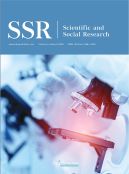Abstract
21st-century learning is seen as a huge transformation in education. It is a transformation that meets the needs of today’s education in terms of sustainable development and has a huge impact on education. This article discusses a blend of interesting and impressive high–quality teaching and learning innovations based on three different subjects, such as Chinese, Mathematics, and Science. This innovative approach to sustainability will help students to understand the process or concept and increase their spirit and motivation to learn and promote their appreciation of educational innovation in China and Malaysia.
References
Rieckmann M, 2017, Education for Sustainable Development Goals: Learning Objectives. UNESCO Publishing, Paris.
Mensah J, 2019, Sustainable Development: Meaning, History, Principles, Pillars, and Implications for Human Action. Cogent Social Sciences, 5(1): 1653531 https://doi.org/10.1080/23311886.2019.1653531
Lambrechts WD, Hindson JJ, (eds) 2016, Exploring Collaborative Networks, Critical Characteristics and Evaluation Practices, in Research and Innovation in Education for Sustainable Development, Environment and School Initiatives, Vienna. https://research.ou.nl/ws/files/31348578/CoDeS_research_book_web.pdf
Lee RM, Yuan YS, 2018, Innovation Education in China: Preparing Attitudes, Approaches, and intellectual environments for life in the automation economy. In Higher Education in the Era of the Fourth Industrial Revolution, 2018: 93–119. https://doi.org/10.1007/978-981-13-0194-0_5
Wang, Y, 2020, A Study on College English High-Efficiency Class Based on Blended Teaching Mode of Flipped Classroom. Theory and Practice in Language Studies, 10(9): 1066–1071. http://dx.doi.org/10.17507/tpls.1009.08
Nguyen T-H, Pham XL, Nguyen TT, 2021, The Impact of Design Thinking on Problem Solving and Teamwork Mindset in A Flipped Classroom. Eurasian Journal of Educational Research, 96(96): 30–50. https://doi.org/10.14689/ejer.2021.96.3
von Thienen J, Royalty A, Meinel C, 2017, Design Thinking in Higher Education: How Students Become Dedicated Creative Problem Solvers, in Handbook of Research on Creative Problem-Solving Skill Development in Higher Education, 306–328. https://doi.org/10.4018/978-1-5225-0643-0.ch014
Güngör A, Kool D, Lee M, et al., 2022, The Use of Virtual Reality in A Chemistry Lab and Its Impact on Students’ Self-Efficacy, Interest, Self-Concept and Laboratory Anxiety. Eurasia Journal of Mathematics Science and Technology Education, 18(3): em2090. https://doi.org/10.29333/ejmste/11814
Liu R, Wang L, Lei J, et al., 2020, Effects of an Immersive Virtual Reality–Based Classroom on Students’ Learning Performance in Science Lessons. British Journal of Educational Technology, 51(6): 2034–2049. https://doi.org/10.1111/bjet.13028
Guo Z, 2016, The Cultivation of 4C’s in China—Critical Thinking, Communication, Collaboration and Creativity. DEStech Transactions on Social Science, Education and Human Science.
He R, 2021, A Probe into the Ways of Cultivating Students’ Creative Thinking in Junior Chinese Teaching. Frontiers in Educational Research, 4(12): 23–29. https://doi.org/10.25236/FER.2021.041205.
Birgili B, 2015, Creative and Critical Thinking Skills in Problem-Based Learning Environments. Journal of Gifted Education and Creativity, 2(2): 71–80. https://doi.org/10.18200/JGEDC.2015214253
Tang T, Vezzani V, Eriksson V, 2020, Developing Critical Thinking, Collective Creativity Skills and Problem Solving Through Playful Design Jams. Thinking Skills and Creativity, 37: 100696. https://doi.org/10.1016/j.tsc.2020.100696
Robin BR, 2016, The Power of Digital Storytelling to Support Teaching and Learning. Digital Education Review, 2016(30): 17–29.
Abd Manan MS, Wang X, Tang X, 2022, Innovating Animation Teaching System: An Experimental Survey on the Integration of Design Thinking and Creative Methods for Animation Education in China. Open Journal of Social Sciences, 10(3): 379–388. https://doi.org/10.4236/jss.2022.103028
Joutsenlahti J, Perkkilä P, 2019, Sustainability Development in Mathematics Education—A Case Study of What Kind of Meanings Do Prospective Class Teachers Find for the Mathematical Symbol “2 3”?. Sustainability, 11(2): 457. https://doi.org/10.3390/su11020457
Fouryza D, Amin SM, Ekawati R, 2019, Designing Lesson Plan of Integer Number Operation Based on Fun and Easy Math (FEM) Approach. International Journal of Evaluation and Research in Education, 8(1): 103–109.
Scoullos MJ, 2010, Education for Sustainable Development: The Concept and its Connection to Tolerance and Democracy, in Education for Sustainable Development: Challenges, Strategies, and Practices in a Globalizing World, SAGE Books, California, 47-63.
Pedro F, Subosa M, Rivas A, et al., 2019, Artificial Intelligence in Education: Challenges and Opportunities for Sustainable Development, UNESCO Publishing, Paris.
Samat AA, Rosli R, 2020, Exploring teachers’ perceptions of primary school mathematics textbook. International Journal of Academic Research in Progressive Education and Development, 9(1): 286–300. http://dx.doi.org/10.6007/IJARPED/v9-i1/7043
Jamian AR, Idris MR, 2022, Transformation of Education in Malay Language to Contribute Future Development of The Nation. Proceedings of International Conference on Language, Literature and Culture, 2022(1): 287.
Yeboah R, Asante EA, Opoku-Asare NA, 2016, Teaching Interactive Art Lessons with Recycled Waste Materials as Instructional Resources. Journal of Education and Practice, 7(14): 38–59.
Benavot A, 2014, Education for Sustainable Development in Primary and Secondary Education, UNESCO, Paris.
Ranjbari M, Esfandabadi ZS, Zanetti MC, et al., 2021, Three Pillars of Sustainability in the Wake of COVID-19: A Systematic Review and Future Research Agenda for Sustainable Development. Journal of Cleaner Production, 297: 126660. https://doi.org/10.1016/j.jclepro.2021.126660
Simamora RM, De Fretes D, Purba ED, 2020, Practices, Challenges, and Prospects of Online Learning During Covid-19 Pandemic in Higher Education: Lecturer Perspectives. Studies in Learning and Teaching, 1(3): 185–208. https://doi.org/10.46627/silet.v1i3.45
Licorish SA, Owen HE, Daniel B, 2018, Students’ Perception of Kahoot!’s Influence on Teaching and Learning. Research and Practice in Technology Enhanced Learning, 13(1): 1–23. https://doi.org/10.1186/s41039-018-0078-8
Yahaya NH, 2021, Acceptance on Open and Distance Learning Method Amongst Special Education Needs Teachers During Movement Control Order. Journal of Media and Information Warfare (JMIW), 14(1): 68–79.
